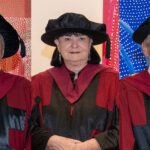New software that enables an optimal, streamlined approach to mine plant shutdown scheduling to fast track maintenance was the overall winner at today’s Curtin Commercial Innovation Awards, resulting in $15,000 for its inventors.
Shutdown maintenance optimisation was a research project involving Curtin researchers Associate Professor Ryan Loxton, Dr Reza Parand, Dr Yufei Sun, Mr Chongyi Liu and Mr Praveen Jayakumari. The project was initiated and funded by Linkforce Engineering, one of the largest engineering services companies in WA.
Associate Professor Loxton explained the project team developed unique mathematical algorithms for scheduling maintenance activities in mine plant shutdowns.
“Scheduling shutdowns is currently a time-consuming manual process. These algorithms take just seconds to run and consider a range of factors such as activity workflow, plant access restrictions, safety regulations, and personnel and equipment availability with the aim of creating an optimal schedule that minimises maintenance downtime,” Associate Professor Loxton said.
Linkforce Engineering is currently developing a professional shutdown planning system based on the Curtin team’s algorithms, and is exploring commercialisation opportunities across the mining and resource sectors.
Other category winning projects at this year’s event were a therapeutic strategy to target cancer stem cells; iQBuds – specially designed augmented earphones; a training tool for home-based aged care; a large scale 3D image reconstruction system; a biometric market research laboratory; and ethylene antagonists that can be used to manage produce harvest and ripening.
Director of Curtin’s Office of IP Commercialisation Rohan McDougall said the annual awards event was a great way to showcase the diversity of research projects at the university and the importance of providing a pathway to commercialisation for researchers.
“The diversity of this year’s finalists demonstrates the unique, commercially relevant project work being undertaken by academics at Curtin. Curtin has a successful history of generating first to market products and has a focus on continually improving its engagement with industry,” Mr McDougall said.
“The Awards program rewards and celebrates academic staff who think about commercial application of their work.”
The other category winners included:
Health Sciences Award – Researchers from Curtin’s Faculty of Health Sciences have identified a therapeutic strategy entitled Selectively Targeting Cancer using Peptides.
Led by cell biology and cancer researcher Professor Arunasalam Dharmarajan, the strategy targets cancer stem cells by using peptides to inhibit the Wnt signal pathway, a crucial pathway for cancer cell survival. These peptides are candidates for the development of a new anticancer drug treatment that may be used in combination with existing cancer therapies.
Science and Engineering Award – iQBuds Augmented Earphones was developed by the engineering team at Nuheara, a startup company, with assistance from Professor Sven Nordhold and his team in the Department of Electrical and Computer Engineering at Curtin.
The project uses signal processing to support a new generation of wireless ear pieces aimed at people who have difficulty hearing in social situations, such as those in the 55 years plus age group, as well as people who want to stay connected to their smart device and switch between the digital and ‘real world’ audio inputs.
The Curtin team has been working with the engineering team at Nuheara and plan to launch the product in December 2016.
Teaching and Learning Award – Virtual Home Visit (VHV) Training Tool is a web-based virtual learning environment that is used to train health care professionals in home-based aged care, designed by a team from Curtin’s School of Physiotherapy and Exercise Science.
Team member Ms Anne Furness explained the VHV provides the learner with a ‘real’ experience where they identify falls risks and hazards and gain first-hand experience with social interactions relating to the care of the older adult. This information is used to develop an appropriate falls risk management plan which, when put into action, will assist the client to remain at home.
“Australia has a rapidly aging population who prefer to remain living at home for as long as possible,” Ms Furness said.
“This VHV provides a cost-effective approach to this type of training because it can be accessed via phone, tablet and computer and therefore delivered to large numbers of learners, anywhere, anytime.”
Humanities Award – Curtin HIVE manager Dr Andrew Woods and his colleagues have developed the Large Scale 3D Reconstruction System to conduct a 3D imaging survey of the wrecks of HMAS Sydney II and HSK Kormoran and develop digital 3D models of the sites.
The system has been used to capture half a million images of the Sydney and Kormoran wreck-sites and the team are now using the computing power of the Pawsey Supercomputer Centre to process the large dataset. Using a process called photogrammetric 3D reconstruction, the team is using large numbers of high-resolution images to create the detailed 3D reconstructions in a reasonable timeframe.
The technique has potential application in subsea oil and gas installations, underground mine sites, rock art fields and other sites where many images would be required to create a digital 3D model of an expansive site.
Business Award – Dr Ian Phau and his team from the Curtin School of Marketing have created the Biometric Market Research Laboratory, an integrated approach to measuring a person’s reaction to a marketing stimulus.
“Traditionally, to see how a person reacts to a product or marketing materials, market researchers conduct surveys or interviews,” Dr Phau said.
“With biometrics, we can measure a person’s physiological reactions, such as eye gaze, pupil dilation, brain activity, facial expression, skin conductance and heart rate, which we can then use to inform a client what a person truly thinks and feels about the marketing stimulus.”
This year’s inaugural Climate KIC award recognised Zora Singh and his team from the School of Science for their project Ethylene Antagonists.
This product could be applied pre or post harvest to crops in liquid form to manage harvest and ripening. The compounds have application in extending storage, transport and shelf life of fruits, vegetables and cut flowers and have the potential to significantly reduce the waste in managing fresh produce.
Student Award – A prize of a scholarship to attend the Curtin Centre for Entrepreneurship program, Ignition, was awarded to Matt Jones of the Autism Academy for Software Quality Assurance (AASQA).
AASQA is dedicated to providing tech career pathways for those on the autism spectrum. Matt will investigate a sustainable social business model for a high school outreach program for the Academy.
The Curtin Commercial Innovation Awards were established in 2007 to celebrate the commercialisation of Curtin staff and students. The competition is now a focal point of the innovation calendar in Western Australia.
The awards were presented today at the State Reception Centre, Frasers, in Kings Park.


